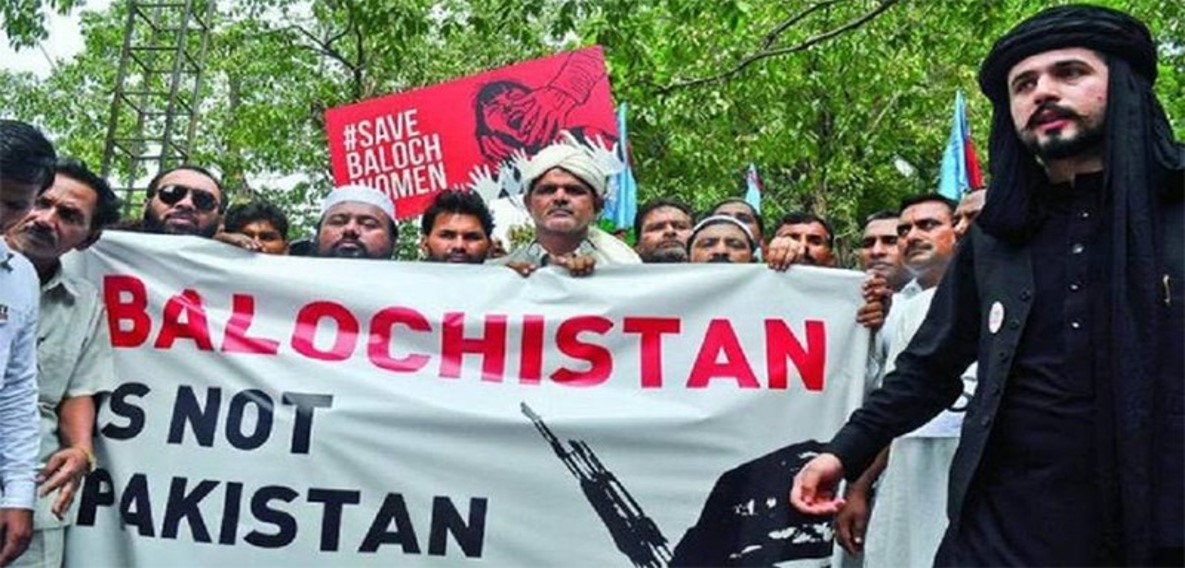Nestled between the blues of the Arabian Sea and surrounded by Iran, Afghanistan and Pakistan, Balochistan is a region caught in the midst of conflict and hostility- marked by a dismal human rights record and a continued separatist movement against Pakistan’s atrocious rule. Deep-seated feelings of alienation prevail among the local Baloch over the forced accession of Balochistan in 1948 by Pakistan.
Before the British annexed Balochistan in 1839, it was an independent state. While Western Balochistan was given to Afghanistan and Northern Balochistan to Iran, Eastern Balochistan maintained its independence through treaty relations with the British. The princely state of Kalat, which on 25 March 1947 was declared independent, was occupied by Pakistani forces in 1948 provoking an involuntary accession to Pakistan. Despite being an integral part of Pakistan thereon, the region only became a province in 1970.
The region’s decades long grievances range from being denied access to basic amenities like food and water to not having a fair share in the use of its well-endowed lands. Over 40% of Balochistan is below the poverty line. Balochistan, which is rich in natural reserves of gold, copper, oil, chromite, natural gas and other minerals, has faced constant exploitation with widespread poverty and bad governance leading to a declining growth rate. The mining sector which is largely unregulated, is now dominated by Chinese companies. Dera Bugti which is plenteous in natural gas still has its populace using wood for fires as most of the gas is used up by other more important provinces such as Punjab and Sindh.
Balochistan’s oceanic coastline and its location at a critical juncture of the Strait of Hormuz makes it a key area for Chinese hegemonic interests. One of the most important parts of the Chinese megaproject, Belt & Road Initiative (BRI), is the China Pakistan Economic Corridor (CPEC) which passes through Balochistan with Gwadar Port as its backbone. Labeled as a ‘gamechanger’ CPEC has proved to be more of bane than a boon to local Baloch who have had to deal with the burden of environmental degradation, unemployment and a large influx of migrants from other provinces of Pakistan leading to a state-sponsored demographic engineering with the majority being converted into a minority.
According to a report by the Federation of Pakistan Chambers of Commerce and Industry (FPCCI), it was estimated that Chinese nationals working for CPEC would outnumber local Baloch by the year 2048. Under a 40-year lease, control of Gwadar port has been handed over to the China Overseas Port Holding Company (COPH). With China gaining a stronghold in Gwadar, local Baloch fishermen have been barred from their traditional fishing grounds sparking outrage among locals who have protested against illegal fishing by Chinese trawlers. Pakistan’s leadership has assured locals that no licenses have been granted to foreign trawlers but on-ground reports suggest otherwise. Local leaders also fear that the sovereignty of Balochistan has been completely transferred into the hands of the Chinese and that their land will one day be yet another Chinese colony.
Balochistan’s rugged mountains, deserts, and porous borders with Iran and Afghanistan have also led to the region being a transit point for narcotics trade- particularly opium, hashish and crystal. Earlier, Balochistan’s madrassa students would find part-time employment in Afghanistan’s poppy cultivation. The province has provided access for major drug peddlers to international markets across the Durand Line.
Balochistan has faced five phases of insurgency since the 1948 forced accession until now. Pakistani security forces have unleashed brutal counterinsurgency measures that include hiring of private militia known locally as death squads. These death squads have gained notoriety for the appalling number of enforced disappearances targeting Baloch nationalist leaders. Pakistan’s leadership and judicial system have failed to take any action against these heinous crimes. What is even more nightmarish for Baloch activists is that these death squads operate overseas too as seen in the case of the ghastly murder of Karima Baloch in Canada in December 2020 and Sajid Hussain Baloch in Sweden in 2012- both said to have been abducted and then killed at the behest of Pakistan’s Inter-Services Intelligence (ISI).
Terror attacks in the region has increased manifolds, with the prime target being CPEC projects and Chinese expats. A strong presence of the Afghan Taliban, Tehrik-i-Taliban Pakistan (TTP), IS militants, and other extremist groups has been felt in the region for decades. On the other hand, Baloch nationalists have been fighting an uphill battle to separate the Baloch identity from the more radicalized Islamic Republic.
Among Baloch separatist organizations such as Balochistan Liberation Front (BLF), Baloch Liberation Army (BLA), Baloch Republic Party (BRP), all have varying ideologies with some advocating for Greater Balochistan- comprising of Pakistan occupied Balochistan as well as some part of Iran and Afghanistan and others seeking greater autonomy.
Balochs have always been placed under the iron claws of the Pakistani Establishment. However, with the dawn of the social media age, more Baloch youth are empowered and aware. The abominable human rights abuses by the state of Pakistan have come to the fore, triggering a global cry for justice against the atrocities. Pakistan failing to address the failure of development of the province is only fueling these separatist sentiments.
Courtesy: Gremcy Sequara

